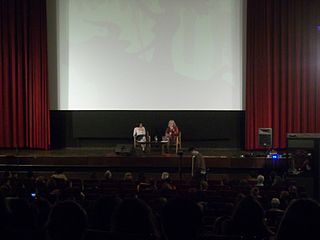A Quote by Markus Zusak
Just be patient, she told herself, and with the mounting pages, the strength of her writing fist grew.
Related Quotes
Her little fists pummeled at him, and he accepted the abuse. Until he realized she’d made an improper fist and was actually hurting herself. He wound an arm around her waist, spun her and slammed her into the hard line of his body to still her. “Let me go!” “In a minute.” As she struggled, he pulled her thumb out from beneath her fingers and rearranged her fist. “Hit like this.” Done, he released her.
I found her lying on her stomach, her hind legs stretched out straight, and her front feet folded back under her chest. She had laid her head on his grave. I saw the trail where she had dragged herself through the leaves. The way she lay there, I thought she was alive. I called her name. She made no movement. With the last ounce of strength in her body, she had dragged herself to the grave of Old Dan.
Be your own place of safety, she told herself, straightening. No crossbar in the world could protect her from what lay ahead, and neither could a tiny knife ticked in her boot - though there her tiny knife would most certainly remain - and neither could a man, not even Akiva. She had to be her own strength, complete unto herself.
The first thing was to get down to Addie Richardson's henhouse, and that was a goodish way, four or five miles. She found herself wondering if the Lord was going to send her an eagle to fly her those four miles, or send Elijah in his fiery chariot to give her a lift. Blasphemy," she told herself complacently. "The Lord provides strength, not taxicabs.
I think Eleanor Roosevelt always had a most incredible comfort writing letters. I mean, she was in the habit of writing letters. And that's where she allowed her fantasies to flourish. That's where she allowed her emotions to really evolve. And that's where she allowed herself to express herself really fully, and sometimes whimsically, very often romantically. And it really starts with her letters to her father, who is lifelong her primary love.
Once upon a time there was a girl who wanted to put her fist through a mirror. She would tell everyone it was so that she could see what was on the other side, but really, it was so that she wouldn't have to look at herself. That, and because she thought she might be able to steal a piece of glass when no one was looking, and use it to carve her heart out of her chest.
Perhaps I will die too, she told herself, and the thought did not seem so terrible to her. If she flung herself from the window, she could put an end to her suffering, and in the years to come the singers would write songs of her grief. Her body would lie on the stones below, broken and innocent, shaming all those who had betrayed her. Sansa went so far as to cross the bedchamber and throw open the shutters ... but then her courage left her, and she ran back to her bed, sobbing.
A friend, who's a psychologist, told me about a patient once: a woman who was well educated, had a good job, a house and a loving husband. "I did everything right in my life," said the woman. "But I'm still not happy." She never did what she herself wanted, but what she believed society expected from her.
She emptied herself of Fabio and of herself, of all the useless efforts she had made to get where she was and find nothing there. With detached curiosity she observed the rebirth of her weaknesses, her obsessions. This time she would let them decide, since she hadn't been able to do anything anyway. Against certain parts of yourself you remain powerless, she said to herself, as she regressed pleasurably to the time when she was a girl.
In fact her maturity and blood kinship converted her passion to fever, so it was more affliction than affection. It literally knocked her down at night, and raised her up in the morning, for when she dragged herself off to bed, having spent another day without his presence, her heart beat like a gloved fist against her ribs. And in the morning, long before she was fully awake, she felt a longing so bitter and tight it yanked her out of a sleep swept clean of dreams.
She was the first person on either side of her family to go to college, and she held herself to insanely high standards. She worried a lot about whether she was good enough. It was surprising to see how relieved she seemed whenever I told her how amazing she was. I wanted her to feel strong and free. She was beautiful when she was free.
My mom is just authentically herself all the time. She loves herself. She loves her sense of humor. She brings people in when she talks. She brings people in when she laughs. Watching her, I think that that's when I first learned and was encouraged to be myself and to sort of love and live in that way.
































